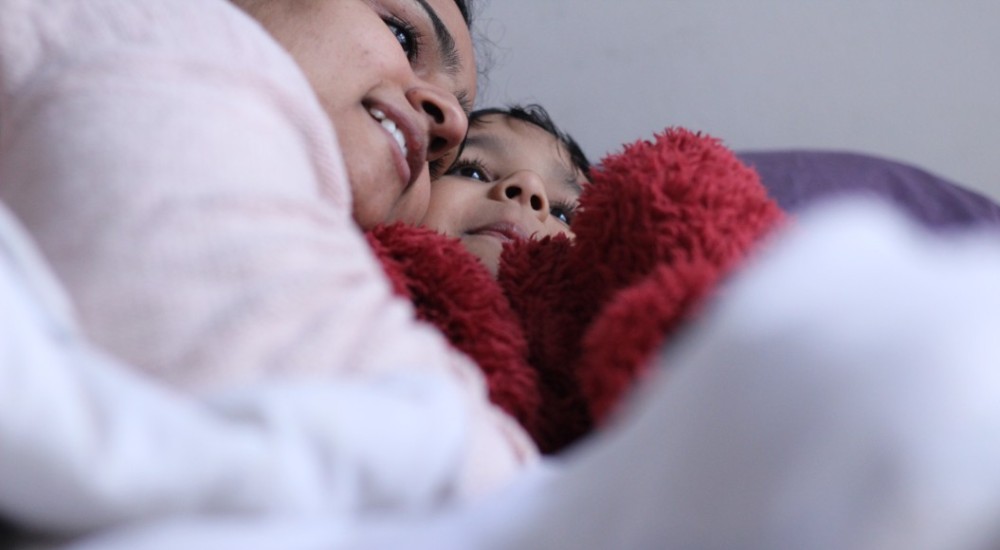
One year into a global pandemic and physical, emotional, and mental health has become top of mind for many families. Our daily lives have shifted in a variety of ways. We spend more time at home and less time traveling. We see our friends less and our household family members more. We may be juggling work-from-home responsibilities on top of childcare/homeschooling. We may feel anxious or uncertain about what the future holds. To say we’ve all had to pivot in this past year is an understatement.
Fortunately, there is a restorative way that we can pamper our minds and our bodies without having to step out the front door.
Sleep is the ultimate body builder. The mega mood booster. One of our body’s primary defense mechanisms. Sleep restores energy, resets our attention, increases our body’s immune response, helps us deal with emotionally charged situations, clears our brains of damaging waste products, and allows us to process and store memories…. the list goes on and on.
These functions are vital for all humans, but never is it more important to get healthy sleep than during the early years of childhood development. Sleep helps children grow, learn, and laugh. It sets the stage for exploring and making sense of the world around. It builds confidence and resilience. It bolsters physical and mental wellbeing.
And in a year wrought with change - many children have experienced a loss of extracurricular activities, time away from friends, heavier reliance on devices, disruptions to daily schedules and routines, and increased fears and anxieties - our children need sleep now more than ever.
But sleep is also easily disrupted by the behavioural, environmental, and emotional shifts that we have all been experiencing. The sleep system can be hijacked by increased arousal, elevated screen time, emotional dysregulation, and a more sedentary lifestyle. In other words, sleep may be hardest to come by at the exact time when we need it the most.
If you’re feeling like your family’s sleep habits have veered a little off course, fear not. Here are a few ways you can once again reap the benefits of a good night’s sleep:
1. Establish strong and predictable routines
- Strive to keep consistent sleep and wake schedules 7 days a week, including age-appropriate naps for young children.
- Help the body wind down with a pre-sleep routine, a soothing sequence leading up to bedtime to let the brain know that sleep is to follow.
2. Set a sleep-promoting environment
- Dampen disruptive lights/sound. Dim the lights in the evening hours and opt for those with red/orange hues. You can try using a fan or sound machine to block out unwanted noise.
- Minimize the use of devices, especially in the 1-2 hours before bed. They can be stimulating to the brain and often emit blue light (reduces the release of the sleep hormone, melatonin) making it difficult for our bodies to wind down.
3. Help the body to relax
- Avoid caffeine, alcohol, or sugary drinks and snacks in the hours leading up to bedtime.
- Eat dinner early to limit large meals right before sleep. A light, healthy snack before bed is fine to curb that nighttime hunger.
- Practice deep breathing, guided meditation, and progressive muscle relaxation techniques to calm a racing mind. Even 10 deep breaths can calm the body and mind enough to drift off into a restful slumber. Do these exercises with your children too as part of their bedtime routine. It’s an excellent opportunity to connect and instil confidence in the sleep space.
4. Get outside and be active regularly
- Spending time outside in natural light helps to regulate our sleep system, as the brain releases melatonin in response to the difference between light and dark that our eyes are exposed to in a 24-hour cycle. The greater the difference between light and dark in a day, the better our sleep. The sun’s light is up to 500 times stronger than indoor, artificial lights, and provides a clear contrast from when the world goes dark at night.
- Take a family walk or play outside in the yard for even more benefits. Fresh air and physical activity send oxygen-rich blood to our brains and release mood boosting endorphins. This translates to a calmer mind and body when later trying to fall asleep.
- Avoid heavy exercise too close to bedtime, however, to allow the body time to shift into rest mode.
5. Take time together to connect as a family
- Be intentional about setting aside time to check in as a family and discuss the day’s events. Ask how you can support each other. Take turns expressing one thing that you are grateful for or looking forward to tomorrow.
- In addition to stimulating emotional wellness, positive communication and connectedness are demonstrated to promote healthy sleep for the whole family.
__________________
About the author: Denise is a university educator, a sleep enthusiast, and a mom of two. She has been a family partner and advocate for the BC Children's Sleep Lab since her 3-year-old son was assessed and treated for a sleep-breathing disorder. Denise also develops resources and offers services to support families and their children with sleep.

For more tips on building healthy sleep habits, check out NEW sleep content and resources at keltymentalhealth.ca/sleeping-well, or listen to an episode from the Kelty Centre’s Where You Are podcast: Sleep: Building the Foundation for Family Mental Wellness.







